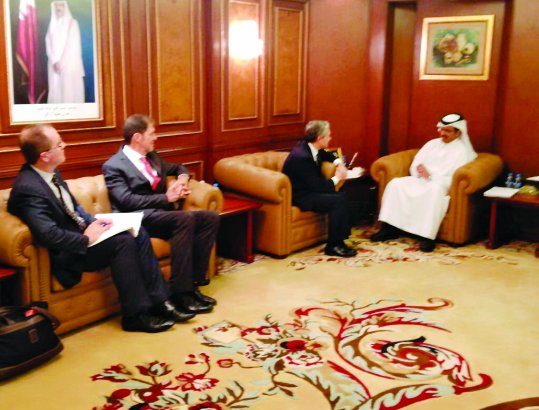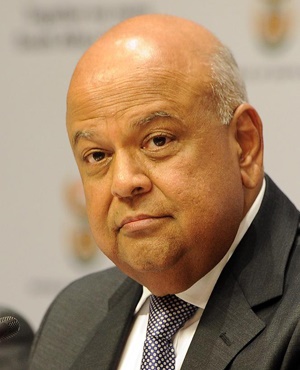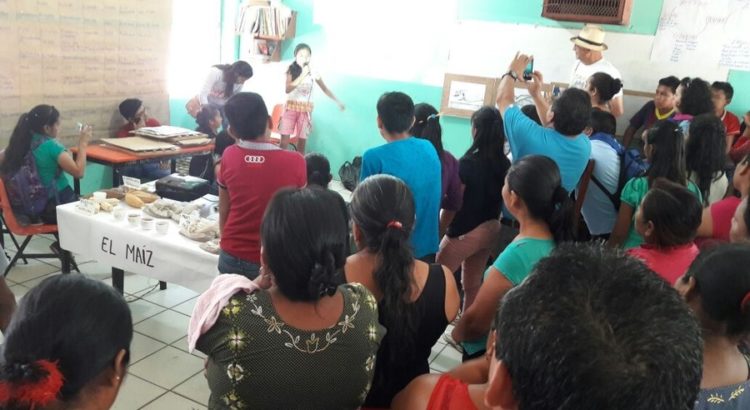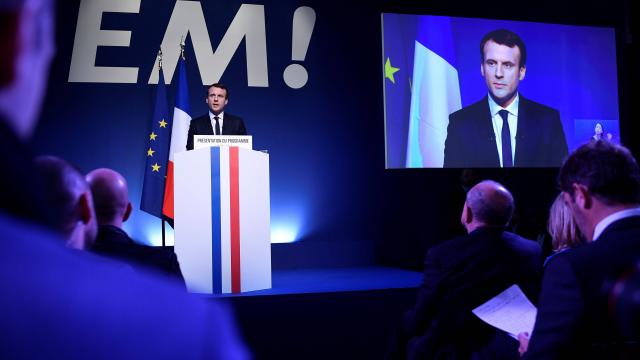Francia/Marzo de 2017/Fuente: Ouest France
RESUMEN: Emmanuel Macron, acusado de ser demasiado vago en sus propuestas, es ahora favorito para ganar en las encuestas, el candidato de En Marche! debe presentar esta mañana un documento de treinta páginas que se estructura alrededor de diez temas generales. En educacion propone: La autonomía de las escuelas en cuanto a la contratación pedagógica; una prima de 3 000 euros netos al año para los maestros en prioridad de zona PWR +; en estas áreas, reducir a la mitad el número de alumnos de CP-CE1 demanera que sea no más de 12 estudiantes por maestro; creación de 4 000 a 5 000 puestos de profesores; la restauración de las clases en dos idiomas; la restauración de estudios dirigidos «por todas partes» movilizando «maestros, voluntarios jubilados y estudiantes; prohibición del uso de teléfonos móviles en los colegios de los recintos y las escuelas primarias; limitar el examen final en cuatro materias obligatorias; las universidades pueden contratar a maestros y establecer su formación; la enseñanza de la religión en la escuela, paso de la Cultura en la cantidad de € 500 por cada 18 Francés entre otros temas.
Fin des régimes spéciaux de retraite, « grande loi de moralisation de la vie publique », réforme de l’indemnisation chômage… Emmanuel Macron, accusé d’être trop vague dans ses propositions, a abattu ce jeudi les cartes sur son programme pour tenter de faire taire les critiques. Désormais favori pour l’emporter selon les sondages, le candidat d’En Marche ! doit présenter ce matin un document d’une trentaine de pages qui s’articule autour d’une dizaine de grands thèmes.
Un candidat « vague », qui « n’a pas de programme », ou cherche en permanence à ménager tantôt à gauche, tantôt à droite. Emmanuel Macron s’est employé ce jeudi matin à casser l’image bâtie par ses détracteurs. Lui que les sondages placent dorénavant en très bonne place veut convaincre qu’au-delà des mots, il a aussi – surtout – des idées concrètes.
Voici les principales mesures du programme présidentiel que le candidat d’En Marche ! a présenté ce matin.
MORALISATION DE LA VIE PUBLIQUE
– Interdiction pour les parlementaires d’exercer des activités de conseil
– Fiscalisation de l’intégralité de la rémunération des parlementaires, notamment l’IRFM (indemnité représentative de frais de mandat)
– Fin du régime spécial de retraite des parlementaires
– Interdiction pour les parlementaires d’employer des proches ou des membres de leur famille
TRAVAIL / EMPLOI
– Organisation « de la vie économique et sociale au niveau de la branche et de l’entreprise ». Les 35 heures pourront être assouplies par des « accords négociés majoritaires »
– Instauration d’un bonus/malus pour les entreprises abusant des CDD courts
– Création d’un système universel d’assurance-chômage financé par l’impôt et piloté par l’État, ouvert aux entrepreneurs, aux agriculteurs, aux indépendants, aux professions libérales, ainsi qu’aux salariés qui démissionnent, dans la limite d’une fois tous les cinq ans. Dans ce cadre, suppression de la part salariale des cotisations chômage, en plus de la cotisation maladie, grâce à une hausse de la CSG d’1,7 point
– Hausse de la prime d’activité de 50 %
– Suspension du versement des allocations chômage après le refus de plus de deux offres d’emploi « décent », pour un salaire qui « n’est pas inférieur de plus de 20-25 % » à l’ancien poste
– Aides à la mobilité pour les chômeurs
– Plan d’investissement de 50 milliards d’euros dont 15 milliards pour la formation des chômeurs et jeunes sans qualification
– Création d’un système universel de retraite
– Pérennisation du CICE (Crédit d’impôt pour la compétitivité et l’emploi) sous forme d’allégement de charges pérenne.
– Baisse de l’impôt sur les sociétés de 33,3 à 25 % pour rejoindre la moyenne européenne
– Transformation de l’ISF en « Impôt sur la fortune immobilière » (le patrimoine financier et en actions ne sera plus assujetti)
ÉDUCATION
– Autonomie pour les écoles « en termes de recrutement » au niveau pédagogique
– Prime de 3 000 EUR net par an pour les enseignants en zone prioritaire REP +.
– Dans ces zones, division par deux du nombre d’élèves en CP-CE1 pour qu’il n’y ait pas plus de 12 élèves par enseignant
– Création de 4 000 à 5 000 postes d’enseignants
– Rétablissement des classes bi-langues
– Rétablissement des études dirigées « partout », en mobilisant « les enseignants, des retraités volontaires et des étudiants ». « Dans le parcours de tous les étudiants de France, il y aura ainsi un trimestre dédié à cette activité »
– Interdiction de l’usage des téléphones portables dans l’enceinte des collèges et des écoles primaires
– Modernisation du baccalauréat en limitant l’examen final à quatre matières obligatoires
– Les universités pourront recruter leurs enseignants et définir leurs formations
– Enseignement sur le fait religieux à l’école
– Pass culture d’un montant de 500 € pour chaque Français de 18 ans
POUVOIR D’ACHAT
– Exonération en trois ans de la taxe d’habitation pour 80 % des foyers, pour un coût global de 10 milliards d’euros
– Revalorisation de 100 € par mois de l’allocation adulte handicapé et du minimum vieillesse
SÉCURITÉ
– Création d’une « police de sécurité quotidienne »
– Création de deux nouvelles écoles de police. L’une de 1 000 places, l’autre de 500, pour la formation initiale et continue des agents
– Création de 10 000 postes de policiers et gendarmes
– Recréation d’un vrai renseignement territorial
– Création d’un état-major centralisé du renseignement rapportant directement au Conseil de défense auprès du président de la République
– Création de centres pénitentiaires ad hoc pour les « foreign fighters »
– Renforcement de la coopération européenne en matière de sécurité, création de 5 000 postes de policiers aux frontières au niveau de l’UE.
ENVIRONNEMENT
– 15 milliards d’euros du plan d’investissement consacrés à la transition écologique.
– Réduction de moitié du nombre de jours de pic de pollution atmosphérique, grâce au remplacement des véhicules anciens via la création d’une prime de 1 000 EUR pour l’achat d’un véhicule moins polluant, neuf ou d’occasion.
– Rénovation d’un million de logements mal isolés
– D’ici 2022, 50 % des aliments des cantines scolaires ou d’entreprises devront être bio, écologiques ou issus des circuits courts.
– Réduction à 50 % de « la part du nucléaire dans (la) production d’énergie ».
EUROPE
– Limiter à un an la durée autorisée de séjour d’un travailleur détaché
– Création d’une force de 5 000 garde-frontières avec les partenaires européens
– Imposer les grands groupes internet sur leur chiffre d’affaires réalisé en France
– Mise en place d’un budget de la zone euro avec un Parlement et un ministre de l’Économie et des Finances de la zone euro
– Réserver l’accès aux marchés publics européens aux entreprises localisant au moins la moitié de leur production en Europe
– Création d’un Fonds européen de défense qui financera les équipements militaires communs et d’un Quartier général européen permanent
– Mise en place d’un mécanisme de contrôle des investissements étrangers en Europe pour préserver les secteurs stratégiques
– Lancement dans toute l’Union européenne, après les élections allemandes de l’automne 2017, de conventions démocratiques, qui aboutiront à un projet adopté par tous les pays le souhaitant.
Fuente: http://www.ouest-france.fr/politique/emmanuel-macron/macron-retraite-chomage-education-son-programme-la-loupe-4830698













 Users Today : 64
Users Today : 64 Total Users : 35419243
Total Users : 35419243 Views Today : 75
Views Today : 75 Total views : 3353366
Total views : 3353366